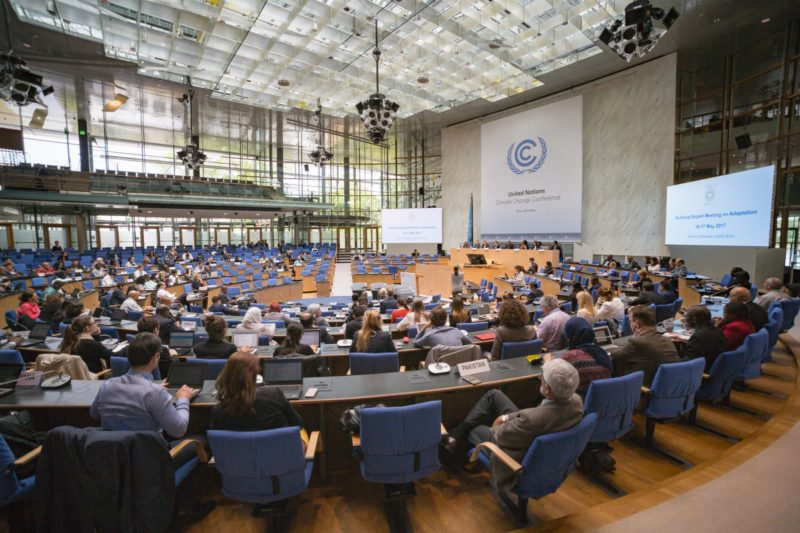Some 17 developed countries and 10 developing countries presented their actions to reduce greenhouse gas emissions to date and highlighted key achievements, challenges and benefits of climate action.

One of those developing countries was Mauritania, the first LDC participating in this type of forum and presenting a clear plan of action on climate change.
During the presentations by the 17 developed countries, it became clear that amongst this group, the overwhelming majority are confident that they will meet their 2020 quantified economy-wide reduction targets.
For many of them, the 2020 emission levels are now expected to be lower than projected two years ago as a result of their climate actions.
In a fifth session of the so-called “multilateral assessment”, the developed countries including, Canada, Cyprus, France, Greece, Iceland, Ireland, Japan, Kazakhstan, Liechtenstein, Luxembourg, Monaco, Portugal, Romania, the Russian Federation, Slovenia, Spain and the United States of America presented progress on their climate actions.
Next to progress on their 2020 targets, these countries clearly showed that green growth in view of a climate neutral future drives a higher GDP and creates jobs. For example, France showed positive GDP impacts and employment effects due to their Energy Transition for Green Growth strategy, which is likely to add between 108,000 and 350,000 new jobs a year by 2035.
To meet their targets, this group of developed countries are implementing a wide range of policies and measures to drive progress and many of these policies have been instrumental in delivering sizeable emission reductions. Carbon pricing, in a form of carbon tax or emissions trading, was presented as a backbone of climate policies for most of these countries.
For example, Canada has successfully introduced a carbon pricing benchmark as one of the pillars of its Pan-Canadian framework on clean growth. Luxembourg has been very successful in implementing energy standards in buildings to increase the efficient use of energy. The Russian Federation is successfully moving forward its forestry sector development programme, which includes reforestation, as a contribution toward reducing the concentration of greenhouse gases in the atmosphere. Another example is Japan, which is widely deploying electric cars as part of its ‘Highly energy-efficient vehicles’ campaign.
Lastly, many of this group of developed countries highlighted that they are preparing long-term strategies towards a climate neutral and resilient future to guide near- and mid-term policy and investment decisions.
In addition to the developed countries, ten developing countries presented updates on the status of their actions to reduce emissions and to report on these in a transparent manner.
In a third session of the so-called “facilitative sharing of views”, India, Indonesia, Israel, Malaysia, Mauritania, Moldova, Montenegro, Morocco, Thailand and Uruguay presented updates on their climate actions and the status of their greenhouse gas emissions and removals.
The experiences shared by some countries include actions and policies to decouple economic growth from the growth of greenhouse gas emissions to achieve the goals set out in their national climate action plans (Nationally Determined Contributions, or NDCs.
Importantly, many also focused on identifying ways of reconciling their priorities for economic growth and poverty eradication with emission reductions.
One remarkable example of what developing countries are doing was India. India presented its ambitious renewable energy plan of increasing the target of renewable energy capacity of 175,000 MW by 2022 mostly on solar power plants, with the Jawaharlal Nehru National Solar Mission (100,000 MW) being central in achieving this target.
Many also shared experiences with the use of market-based policy instruments in promoting renewable energy sources. Examples include the Renewable Energy Certificates (RECs) and renewable energy source certificate scheme in India and Israel respectively.
Some countries also provided information on innovative approaches in promoting support of local governments in implementing national climate change policies, as well as the promotion of private-public partnership and incentive structure to promote climate technologies and innovation.
Action is also happening in the land use, land use change and forestry sector where, for example, Indonesia presented a large number of mitigation measures that are expected to reduce 600 Mt CO2e by 2020, in particular on REDD+ (reducing emissions from deforestation and forest degradation) policies.
Malaysia also provided information on its Sustainable Forest Management and strengthened National forestry and Biodiversity Policies.
Countries including Uruguay, Montenegro, Thailand and Morocco identified their capacity building needs for the implementation of several emission reduction measures in different sectors such as technology to efficiently use energy. Another capacity need highlighted by both countries is the development and consolidation of existing institutional arrangements to integrate climate change into national policies, programmes and plans.
Both the multilateral assessment of developed countries and the facilitative sharing of views by developing countries took place in a cooperative and positive atmosphere. Developed and developing countries clearly see both processes as essential in sharing experience and enhancing international co-operation.
It was also clear that several Parties are looking at how to strengthen the policy infrastructure to implement a long-term vision on climate change.
All countries involved showed their determination to implement their national emission reduction plans defined in their NDCs and to keep working to enhance their capacity and institutions for the future transparency framework under the Paris Agreement.
